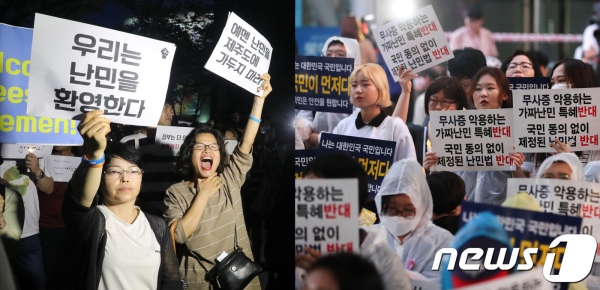According to the U.N. refugee agency, the Yemeni civil war, which has been continuing since 2015, has left over 10,000 casualties and 270,000 refugees. The refugees first headed to an Islamic country, Malaysia, where they could stay for 90 days without a visa. Malaysia, however, is not a member of the Convention on Refugees, so they have no standards for accepting refugees and does not allow them to have jobs. So they eventually made their way to Jeju Island of South Korea. Mainly for the most of developing countries, entering Korea requires a visa. However, owing to Jeju’s tourist-friendly visa policies, people from almost all countries could stay without a visa for 30 days without any special conditions. So Yemeni could enter Jeju without advance visas. When it was known that around 500 Yemeni refugees had entered Jeju Island, there was a dispute among Koreans about the issue of accepting refugees.
Opinions on accepting refugees are sharply divided in Korea. Supporters of accepting refugees argue that Korea is also a member of both the 1951 refugee agreement and the 1967 refugee protocol, which means that Korea promised to the international community that they will oblige to Article 33 of the protocol which states that “No Contracting State shall expel or return a refugee in any manner whatsoever to the frontiers of territories where one’s life or freedom would be threatened on account of one’s race, religion, nationality, membership of a particular social group or political opinion” They also contend that since Korea is now one of the top ten developed countries, it has a moral duty to be responsible for resolving various humanitarian crises in the international community. Furthermore, they argue that there were Korean refugees in the Japanese colonial period and during the Korean War, so we must show an appropriate sense of responsibility to the refugees now.
However, opponents of accepting refugees argue against them on the grounds of fake refugee problems and terrorism and crime. The controversy over fake Yemeni refugees itself arose from the typical excuse for the refugees coming to Jeju; Malaysia is safe but there are no jobs. It is hard to judge whether the refugees came to Korea for their safety or just to get a decent job when jobs are what hundreds of refugees demand upon their arrival. According to the Chosun Daily, the Yemeni refugees said they heard that they could get jobs in Seoul when they arrive in Korea, and even when Jeju provided jobs at fish farms or fishery businesses they refused to work there, complaining about the pay. The opponents assert that the Refugee Act is not an immigration law for poor people. It is for survival for those who are sure to be killed by political and religious forces if they stay at their country. If people just want to earn more money than they do in their country or a third country, they should just apply for immigration or enter as a foreign worker.
Furthermore, there are also arguments about terrorism or crime by refugees. Violent crimes by refugees took place in Korea quite a few times already. In January 2017, a Yemeni refugee molested four Korean women in their 20s in a club in Uijeongbu and is now on trial. On Feb. 16, 2015, an Egyptian refugee was caught trying to steal 46-million-won worth of money in a jewelry shop in Gyeongju. On July 26, complaining about the bread price, a refugee from Sudan threw a brick at a convenience store, breaking the window. He was not a first offender, and the court judged that there was a possibility of re-offending in the future. However, the criminal could not be deported under the terms of the prohibition against extradition, and was sentenced to six months in prison, taking into account the “special situation of the refugees.” In addition, considering violent sex crimes such as Rotterdam child sexual exploitation scandal, New Year’s Eve sexual assaults in Germany and cases of terrorism such as 2016 Brussels bombings, 2016 Nice attack, 2016 Berlin attack, and the 2017 Parsons Green bombing, etc. opponents fear that the same might happen in Korea.

According to Gallup’s poll on July 13, 11% wanted the government to accept refugees as many as possible, 62% wanted to accept refugees as least as possible through thorough screening, and 20 % wanted exile all the refugees. While most Koreans demand thorough screening and minimum acceptance of refugee, the Yemeni refugee problem remains unsolved.


